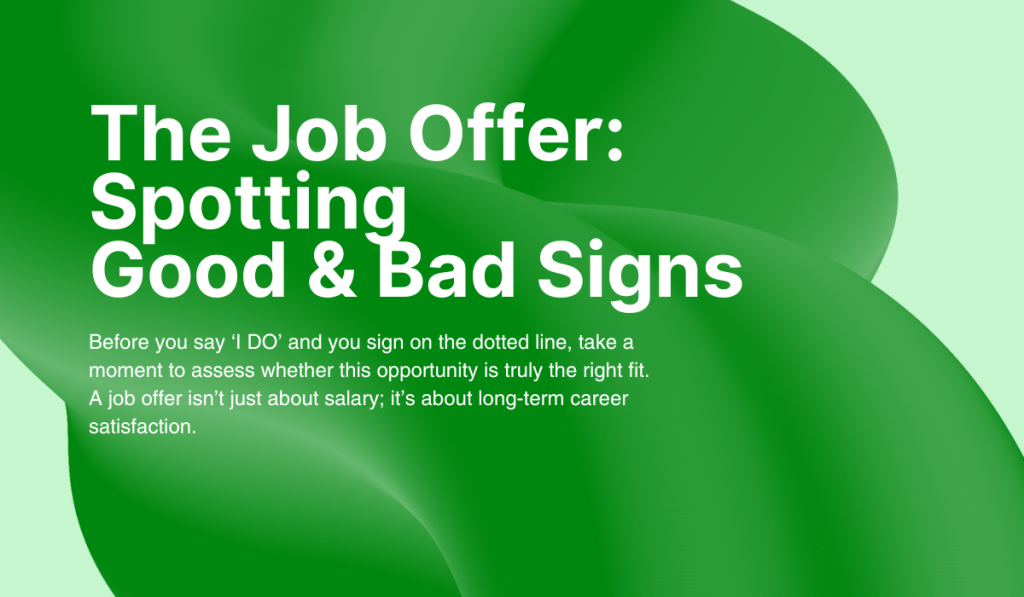You’ve gone through the (often arduous) interview process, impressed the interviewer, and now you have a job offer in hand—exciting! But before you say ‘I DO’ and you sign on the dotted line, take a moment to assess whether this opportunity is truly the right fit. A job offer isn’t just about salary; it’s about long-term career satisfaction.
So, how do you know if you’ve found a gem or if there are hidden deal-breakers? Let’s break down the green flags (good signs) and red flags (warning signs) to watch out for before saying “yes.”

The 5 Signs of a Great Job Offer
1. A Transparent Hiring Process
A company that communicates clearly throughout the hiring process—outlining job expectations, salary, and benefits—shows professionalism and respect for candidates. If they’ve been upfront from day one, that’s a good sign of how they operate internally. First impressions start as early as the job description. Read between the lines and understand what the hiring process says about the company.
2. Competitive Salary & Benefits
A fair salary that reflects industry standards and your experience is key. But don’t just look at the paycheck—does the package include health insurance, bonuses, professional development, or remote work options? Think of what matters to you. Are flexible hours a must for you? How clear is the remote work policy? Is there room to grow and for professional development? All of these elements make up the job offer. Don’t just look at the bottom line.
3. A Healthy Work-Life Balance
A job that encourages reasonable working hours, offers flexible schedules, or supports remote work (if relevant) is a sign of a balanced workplace. Will you be expected to work outside of standard working hours? These are all things you can ask upfront and gauge the replies well. If something is important to you – for example a number of days working remotely, have it in writing. If employees seem happy and not overworked, that’s a positive indicator.
4. Opportunities for Growth
Ask about career progression—does the company offer training, mentorship, or promotion opportunities? A great employer invests in their employees’ long-term development.
5. Positive Company Culture & Leadership
Did the interview process give you a good vibe? Did you feel comfortable conversing with your manager at the interview? A supportive leadership team, positive employee reviews, and a culture of respect and inclusion are all green flags. If employees seem genuinely happy and engaged, it’s likely a great place to work.
5 Warning Signs to Watch Out For
1. Vague Job Description & Expectations
If the role’s responsibilities seem unclear or keep changing during the interview process, that could mean a lack of structure—or that they expect you to juggle multiple roles without proper compensation. Sure, you might take a chance anyway, but down the line you may find this isn’t what you signed up for – or that this was not the direction to thought your role would take.
2. Unrealistic Workload or Expectations
Phrases like “we need someone who can wear many hats” or “we work hard and play hard” can sometimes hint at long hours and burnout culture. Be cautious if employees seem overworked or stressed.
3. High Turnover Rate
Do a little research—if the company has a pattern of employees leaving quickly, it might indicate poor management, lack of job security, or a toxic work environment. If possible, ask friends or family. Malta is small, so chances are you will know someone, who knows someone who has worked there.
4. Poor Communication & Disorganisation
Were there long delays between interview stages? Did they dodge salary questions or seem unprepared? Did you find yourself having to repeat yourself in different stages of the interview with different people due to poor internal communication? Disorganised hiring processes often reflect internal chaos, which could make your job harder down the line. Do you find yourself having to chase for feedback?
5. A “Too Good to Be True” Offer
If an offer seems unbelievably high-paying for the role or lacks clear details, proceed with caution. It could mean hidden expectations, vague contracts, or potential instability in the company. It could even mean an impulsive decision maker. Always read the fine print before signing!
Finally: Trust Your Gut
A job offer is more than just a paycheck—it’s where you’ll spend a significant part of your time, so it should feel right. If a company checks all the green flag boxes, fantastic! But if red flags keep popping up, don’t ignore them. Most importantly: trust your gut. It’s okay to decline an offer that doesn’t align with your values, career goals, or well-being.
When in doubt, ask questions, do your research, and listen to your instincts. Your next job should be a place where you thrive, not just survive!
What are some green or red flags you’ve encountered in a job offer?
Share this article with a friend.



